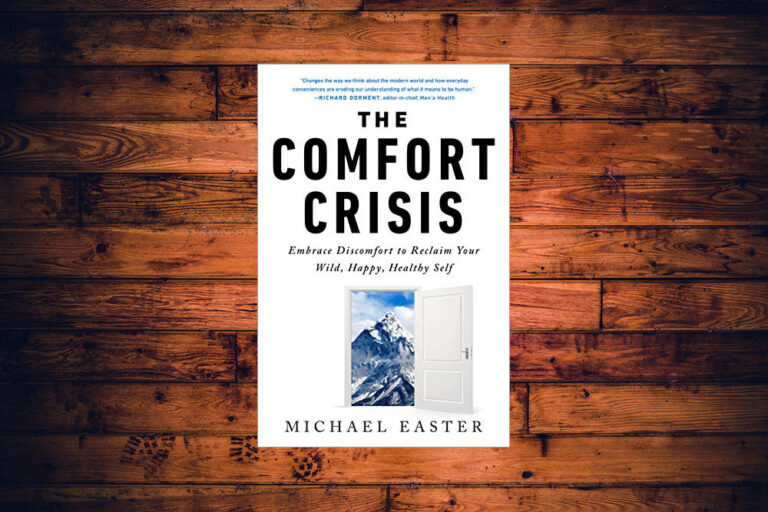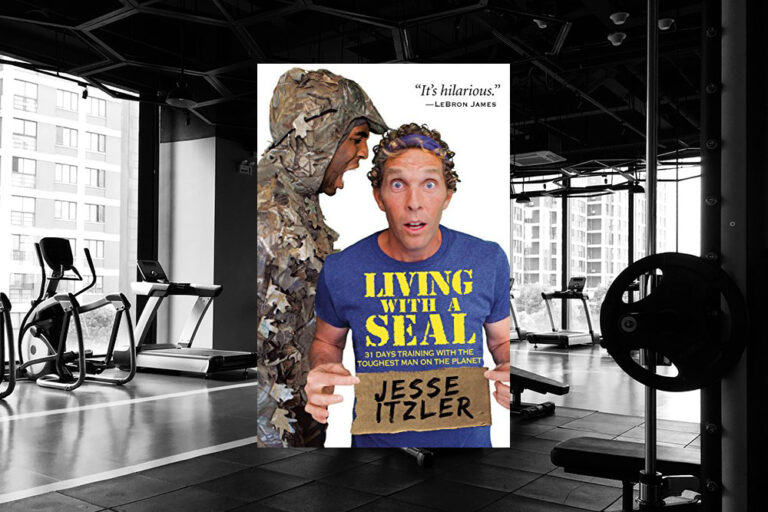#9: Leading Through Discomfort. Spartan Lessons From “10 Rules for Resilience” by Joe De Sena and Lara Pence (Part 2)

In the first part of my notes from Joe De Sena’s book 10 Rules for Resilience: Mental Toughness for Families we covered general thoughts on embracing discomfort.
In the second and final part of my notes we’ll talk about how we can use discomfort to lead ourselves as well as people around us.
We’ll talk about personal values, limitations, destructive coping strategies, confidence, and detaching yourself from your negative emotions.
What Values Do You Demonstrate to People in Your Life?
A lot of us learn resilience lessons way too late in life. The reason? Humans do not want to feel discomfort. In fact, much of our life is spent seeking comfort. That is our downfall. Our utter devotion to what is safe and comfortable is a crack in our foundation that keeps growing with time, until it is a vast and bottomless abyss—one we can’t climb over or out of. The less we allow ourselves to feel discomfort, the less discomfort we can tolerate, until a temperature-controlled bedroom that’s one or two degrees off feels unbearable to us, fruits and vegetables don’t taste like food because we only eat processed junk, and we can’t remember the last time we went for a run (not a jog around the block, a run). Resisting discomfort in our own lives is keeping our kids, families, partners, coworkers, parents, friends, and everyone we interact with and influence from knowing the rewards of discomfort, too.
When you snack yourself into a coma, your kids are watching. When you click the television on at 5 p.m. and off at 11 p.m. every night of the week, your kids are watching. When you commit to try something new, like a fitness class or nutrition program, and can’t make it through the first week without quitting, you aren’t just letting yourself down. When you give up, opt out, or make excuses for why you can’t do this or that—even if you don’t have kids around to bear witness—what values are you demonstrating for your wife, husband, friends, parents, or roommates? What could you be doing instead of sleeping through your life?
Comfort has a tendency to engulf our lives. If we stop challenging ourselves in one aspect of life, we’re more likely to start cruising in another, too.
Stop paying attention to your diet and chances are you’ll slack off with your workouts, too.
Start oversleeping and chances are you won’t get anything important done during the day.
Stop attending to your daily chores and chances are you’ll fail to attend to other tasks, too.
As we surround ourselves with more ease, we find ourselves in a cramped prison cell of our own making. It’s the prison of a tiny comfort zone where everything has to be exactly right to appease our desires. As comfortable as this place may be, it’s a prison nonetheless.
Our uninformed pursuit of comfort may infect people around us and send them to their own prisons. As Joe emphasizes, even if you don’t have kids around to witness your passivity, there are others who see it: your partner, friend, a family member, or even a colleague at work.
Isn’t it odd that we care for our loved ones, yet at the same time hurt them through our own undisciplined choices?
You decided to learn a foreign language. Three weeks later you gave up because you struggled with its grammar. What values do you demonstrate to your girlfriend who cheered you along the way? Will she trust you to keep your word in everyday life if you surrender when things get tough?
You decided to prepare for a qualification that would help you find a better job. You failed it because partying was more important and you didn’t study enough. How are your parents supposed to look at you as a responsible person? Does your behavior demonstrate the values of an adult man?
Two weeks ago you told your overweight coworker you were going to train for a marathon. He asks you today about your progress. It turns out you didn’t even run once. How likely is he going to start taking care of his health considering your bad example?
Your decision to embrace discomfort and stick with it may inspire many people around you. Meanwhile, your lethargy may give a handy excuse to your loved ones to not strive for anything in life.
What kind of a leader would you rather be?
Discomfort brings growth. If you want your loved ones to grow, lead by example and show how your voluntary devotion to doing hard things makes your better. Inspired by your character, they’ll follow your footsteps.
Do You Place Limitations on Yourself?
Be aware that your thoughts affect your family. Notice the limitations you place on yourself, because what you tell yourself is what your family, kids, and spouse will start to tell themselves, too. I’m not strong enough. I don’t have enough money. I’m unprepared. I can’t. Do you want your family to have the same thoughts running through their heads that you do? If not, it’s time to change.
Imagine that your sedentary girlfriend or wife takes up kickboxing. If your initial reaction is to laugh and tell her she won’t handle the tough workouts, you’re not only a dick. You’re also hurting her personal growth through your own limitations.
It’s your perception that kickboxing is so tough she won’t manage. If you impose your limitation on her, you’re robbing her of self-confidence.
What kind of a leader are you if you’re preventing your loved ones from becoming their best selves? How about supporting the decisions they make, no matter how hard you perceive them to be?
If your son wants to start rock climbing and you tell him instead to try a safer sport, you’re projecting your own fears onto him. It’s your perception that rock climbing is dangerous and your fear that he’ll hurt himself.
What kind of a man will he become if his own father questions his abilities to do difficult and scary things?
If your undisciplined friend plans to run every day at 6 am and you tell him to get real, you’re not only a terrible friend. You’re also projecting your own doubts onto him.
True, perhaps he’s been undisciplined all this time. But it doesn’t matter he’ll never change. It’s your perception of his limitations that may end up limiting him.
Each time you offer a reason why someone will fail at something before they even start doing it, you’re sabotaging their growth.
This also applies to your own goals.
If you tell yourself you’re too lazy to wake up at 5:30 am, guess what… You won’t even remember turning off the alarm clock before snoozing again.
If you tell yourself you’re too clumsy and bulky to practice yoga, guess what… You’ll never explore the limits of your flexibility and body coordination.
If you tell yourself you suck at managing finances and it’s too hard to save money, guess what… You’ll always be broke.
Be an encouraging leader. Find reasons why people can do things instead of a saboteur who provides reasons why they’re unable to do so.
Don’t Transform Painful Feelings Into Comfort
Let’s say your child doesn’t get picked for the A team in soccer despite much practice and hard work. What would a normal emotion be following this news? That’s right, disappointment. When you as their parent swoop in at that moment to alleviate your kid’s disappointment with a tub of ice cream or a trip to Target to buy the newest video game, you send them two important but destructive messages: first, that a painful feeling should immediately be attended to and transformed into comfort, and second, that we can alleviate painful feelings with food, purchases, or anything else that you may have brought into the mix. Fast-forward twenty years, and now you’ve got a thirty-year-old who can’t tolerate disappointment and uses ice cream or spending to alleviate the emotion.
When we transform a painful feeling immediately into comfort, we discount the value of the negative emotion. We also lose the opportunity to learn how to handle it with more self-awareness.
We’re pretending the emotion doesn’t exist as we stuff ourselves with food or reward ourselves with a new gadget. But when we get bored with our consolation prize, that unpleasant feeling is still there.
Joe’s words on alleviating painful feelings hit me because I recognize this behavior in myself, too. When I deal with overwhelming stress, I comfort myself with food. It does nothing to help process the feelings and the temporary relief eventually leads to more issues.
I’ve been working on replacing this habit with healthy alternatives like breathwork, walks, or hard workouts. None of these intend to “erase” the painful feeling by indulging in comforts. Instead, they help me change my perspective.
When our loved ones deal with painful feelings, our first instinct may be to attend to them through a similar “consolation prize” mechanism. This way we rob them of what may be a valuable (even if uncomfortable) experience of processing their emotions.
By obsessing too much about comforting people, we may also fail to provide help in the manner they need from us. For example, a person who’s grieving doesn’t want you to entertain them. Any way to “alleviate” their feelings is disrespectful and belittles their crushing (but necessary) pain. What they need is your support, not you denying their emotions.
Life inevitably comes with negative emotions. To grow our mental resilience, we need to learn how to process them as they are instead of drowning them out.
Discipline Grows Confidence
Through discipline we also begin to build one of the most important elements of being a healthy human: confidence. There’s a common thread present in those who come to my farm to change their life and stop unhealthy habits. A massive lack of confidence. For many, their undisciplined life and out-of-control choices have slowly chipped away at any sense of self-esteem. When they begin to implement structure, routine, and the scaffolding for discipline, their confidence grows. Every time their alarm goes off and they don’t hit the snooze button or they complete their chores or get up the mountain without taking a break, it’s like an IV drip of self-esteem. As you become more disciplined, you gather more confidence.
Self-discipline builds self-trust. When you trust yourself to stick to your promises, you know that you’re going to execute. That confidence gives you strength to keep pushing your limits.
Conversely, if you have zero respect for yourself because you never do what you said you would do, how are you supposed to achieve anything in life?
Structures, routines, and weekly goals help enforce self-discipline because they automate your behaviors.
For example, always working out on specific days (say, Monday, Wednesday, and Friday) automates the habit-building process. If it’s any of the workout days, you go and work out without consulting your emotions.
Weekly goals like “I’ll have at least three language classes a week” also help build self-discipline. They provide a clear requirement you must meet in a specific period of time.
Daily structures—for example, early mornings dedicated to journaling and evenings to your side hustle—also help remove your reliance on emotions.
The more you repeat any of the above, the easier it will be to stick to them. Eventually, as weeks go by, you’ll begin to trust your own word.
Each hard decision you voluntarily make to grow your self-discipline strengthens your self-confidence.
Following the theme of this article, this also applies to your role as a leader for your loved ones.
No matter how confident you are, your partner, child, or friend needs their own confidence. The only way they can get it is through building it themselves. Support their efforts by respecting their own rituals, weekly goals, and routines.
Detach Yourself From Your Negative Emotions
Dr. L recommends giving your emotion a name, a strategy that helps her clients deal with fear. “This is a tactic that you can use with any emotion,” she says. “And it’s easy to do. Just name the fear. Literally. Sometimes you can think of a past person who has invoked that emotion and use that same name or just pick any name you like. For example, if a bully at school named Henry scared you as a kid, whenever you recognize that fear is showing up, you say to yourself, Oh, Henry is here to veer me off course. It may sound silly, but it works. High-performance athletes have used this tactic when self-doubt starts to creep in. They give it a name and tell Sally, Bob, Tim, or Candice to fuck off. Using this strategy allows you to detach from overidentifying with the emotion itself. So instead of feeling like a fearful person, you are just a person who is feeling fear.”
Adversity in our lives, whether of voluntary nature or one that arrives unexpectedly, stirs negative emotions like fear, doubt, or anger. Identifying with these feelings (“I’m angry”) makes it harder to overcome the obstacles ahead of you.
Joe De Sena’s co-author Dr. Lara Pence suggests putting distance between yourself and your emotions.
Having a tough workout and doubting you can finish it? You aren’t doubtful. It’s that fucker Frank who’s always being a bitch. You can do it easily while he can watch and keep talking his shit.
Feeling frustrated because you can’t understand a difficult topic you’re studying? You aren’t frustrated. It’s that hot-tempered Hank who always gets angry instead of trying a different approach. You know you can figure it out.
Feeling scared before doing something you were always afraid to do? You aren’t scared. It’s that sissy Sam who’s always scared, yet things always turn out alright later on. You know all it takes is to take a step forward and do it anyway.
Note that it doesn’t mean pretending the emotion doesn’t exist but acknowledging its presence without identifying yourself with it.
You can use the same technique to help other people. Come up with a name for their emotion and tell them to distance themselves from it.
Don’t let your emotions lead you. Increase the distance between your feelings and yourself and act only when intense emotions aren’t clouding your judgment.
Questions to Ponder
1. Do you think about the potential damage you may cause to your loved ones by avoiding discomfort?
2. Are you aware when you place your own limitations on other people?
3. Do you process your painful feelings through indulgence or work through them more constructively?
4. Do you have structures, routines, and set weekly goals to help you cultivate self-discipline?
5. How often do you identify yourself with your sabotaging emotions and let them impact your performance?
If you want more advice on how to lead through discomfort, sign up for a free weekly Discomfort Club newsletter. Enter your email address below:





